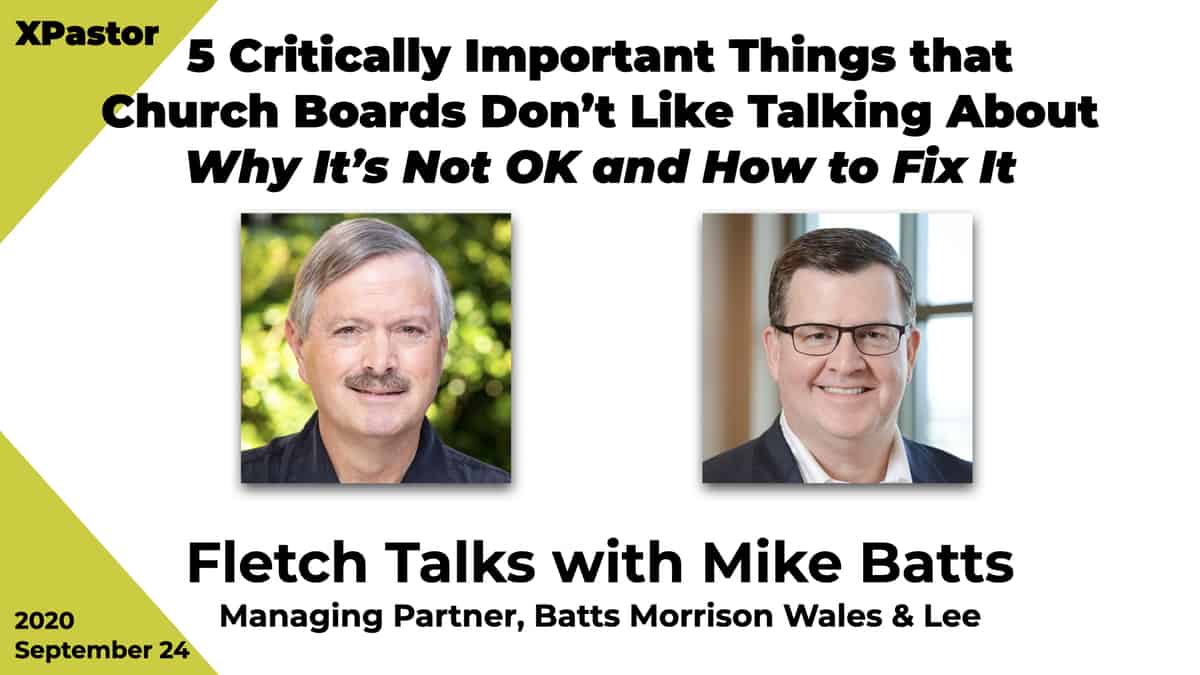XPastor tries to help churches by providing some of the essentials for running a church—items like job descriptions, employment applications, review forms and policies. Below is the Church Constitution of Grace Covenant Church of Austin, Texas.
Article I—Name
The name of this church shall be Grace Covenant Church of Austin, Texas.
Article II—Purpose
The purpose of Grace Covenant Church is to glorify God by leading people to Christ and presenting each believer mature in Christ (Matt. 28:19-20; Eph. 4:11-16; Col. 1:27-28).
In order to accomplish this purpose, we shall, through the enablement of the Holy Spirit, equip the believer to be obedient to God through vital, personal and corporate experiences:
- With Him—Prayer, praise, worship (Matt. 22:37; Psa. 63:1-6).
- In His Word—Preaching, teaching, Bible study, memorization, meditation (Rom. 10:17; Col. 3:16; 2 Tim. 3:16-17, 4:2).
- With one another—Fellowship and the one-anothers (John 13:34-35; Eph. 4:1-3; Heb. 10:24-25).
- In evangelism—Training, sending, going (John 13:34-35, 17:24; Acts 1:8; 1 Pet. 3:15).
Article III—Doctrine
A. Statement of Doctrine
- The Holy Scriptures: We believe in the Scriptures of the Old and New Testaments as the verbally inspired Word of God. Inspiration is God’s superintending of human authors so that, using their own individual personalities, they composed and recorded without error His revelation to man in the original autographs. All Scriptures are authoritative and without error in any category of knowledge, including science and history, and are of supreme and final authority in all matters about which they speak. We believe the Scriptures are to be interpreted in a literal and normal way. This means to consider history, grammar, context, and harmony with other Scriptures as guidelines for interpretation. We believe that the Holy Spirit guides the believer to understand the Bible. We believe that God’s revelation to man is complete, and that He speaks to man primarily through the Scriptures (Matt. 5:18; John 10:35; 2 Tim. 3:16-17; 2 Pet. 1:20-21; Rev. 22:18-19).
- The Godhead: We believe in one Triune God, existing in three persons, Father, Son, and Holy Spirit, eternal in being, identical in essence, equal in power and glory and having the same attributes and perfection (Deut. 6:4; 2 Cor. 13:14).
- The Alienated Condition of Man: We believe that man was created in the image and likeness of God, but that in Adam’s sin the race fell, inherited a sinful nature, became alienated from God, and is totally unable without God’s grace to regain its former position (Gen. 1:26, 3:1-24; Rom. 3:23, 5:12; Eph. 2:12).
- The Person and Work of Christ: We believe that the Lord Jesus, the eternal Son of God, became man, without ceasing to be God, having been conceived of the Holy Spirit and born of the virgin Mary, in order that He might reveal God and redeem sinful man. We believe that He accomplished our redemption through His death on the cross as a substitutionary sacrifice. We believe that our redemption and salvation is guaranteed to us by His literal physical resurrection from the dead (John 1:1, 14, 18; Luke 1:35; Rom. 3:24-26, 4:25).We believe that the Lord Jesus Christ is now in heaven, exalted to the right hand of God, where, as His people’s High Priest, He fulfills the ministry of intercession and advocacy (Heb. 1:3, 3:1, 7:23-25, 9:24, 12:2; 1 John 2:1-2).
- The Personality of the Holy Spirit: We believe the Holy Spirit is a person who convicts the world of sin, righteousness and judgment. He also, in the present age, regenerates believers in Christ, baptizes them into the church, the body of Christ, indwells them permanently, seals them unto the day of redemption, bestows spiritual gifts upon each one, and fills those yielded to Him (John 3:8, 14:16, 15:26-27, 16:7-15; 1 Cor. 12:4-11, 13; Eph. 4:30, 5:18).
- Salvation: We believe that salvation is a gift of God in grace and is received by man through personal faith in the Lord Jesus Christ, whose precious blood was shed for the forgiveness of our sins (John 1:12; Eph. 1:7, 2:8).
- The Eternal Security of the Believer: We believe that all those who have genuinely put their trust in Christ as Savior and Lord have become new creations in Christ and are kept eternally secure by the power of the Holy Spirit and the intercession of Jesus Christ (John 10:27-30; Rom. 8:1, 29-30, 38-39; Eph. 4:30; Heb. 7:25; 1 Pet. 1:5).
- The Church: (a) We believe that the Church is the universal bride and body of Christ. This body is composed of all “born again” believers in Christ regardless of denominational affiliation or church membership (1 Cor. 12:4-27; Eph. 1:22, 5:23-30). (b) We believe that the local church is an assembly of professed believers in Jesus Christ who have the privilege and responsibility to voluntarily join together in one locality for the purpose of equipping each believer to be obedient to God through vital, personal and corporate experiences: with Him, in His Word, with one another, and in evangelism. (c) We believe that the local church is God’s primary means of leading people to Christ and presenting each believer mature in Christ (Matt. 16:18-19, 28:18-20; Acts 2:37-47). (d) We believe that the Lord Jesus instituted the ordinances of baptism and the Lord’s Supper to be observed by all believers until His return. (Matt. 28:19-20; 1 Cor. 11:23-26).
- The Second Coming of Christ: We believe in the personal imminent coming of the Lord Jesus Christ for His own, the Church, and His subsequent premillennial return to earth to set up His kingdom. (Zech. 14:4-11; 1 Thes. 1:9-10, 4:13-18; Rev. 20:6).
- The Eternal State: We believe in the bodily resurrection of all persons. Believers are to be resurrected to enjoy eternal life with God and unbelievers to experience judgment and then eternal suffering apart from God (John 5:28-29; 1 Cor. 15:52; 1 Thes. 4:16; 2 Thes. 1:7-9; Rev. 20:4-6, 21:1-8).
- The Responsibility of Believers: We believe that all believers should seek to walk by the Spirit, not bringing reproach upon their Lord and Savior, and that separation from sinful pleasures and practices is commanded by God (Rom. 12:1-2; 2 Cor. 6:14, 7:1; Gal. 5:16, 25). We believe that it is the obligation of every believer to witness by life and by word to the truths of Holy Scripture and to seek to proclaim the gospel to all the world (Acts 1:8). We believe that it is the responsibility of all believers to remember the work of the Lord in prayer and to support it with their means as the Lord has prospered them (1 Cor. 16:2). We believe that Scripture teaches that the local church shall have the priority in our giving. (Acts 2:37-47; 1 Cor. 9:11, 16:1-2).
B. Covenant of Fellowship
By the help of the Holy Spirit, we covenant:
- To walk together in Christian love.
- To exercise Christian care and watchfulness over one another.
- To pray with and for one another, sharing our burdens, sorrow, and joys.
- To be thoughtful and courteous to one another, to be slow to take offense, and to be quick to forgive and to seek forgiveness.
- To guard the spiritual and scriptural purity, peace and prosperity of the Church and its growth in scriptural knowledge and godliness.
- To assist, as the Lord enables, in the work of the Church, and to promote its usefulness as a witness to the saving grace of God in Christ Jesus.
- To contribute, as the Lord directs, to the financial support of the church, the relief of the needy, and the evangelization of all peoples.
- To love and to pray for all believers in the Lord Jesus Christ.
- To engage regularly in personal Bible reading and prayer, and to establish family devotions where possible.
- To bring up such children as may be entrusted to our care in the nurture and admonition of the Lord.
- To walk circumspectly in the world, to provide things honest in the sight of all men, to be faithful in engagements, exemplary in deportment, denying ungodliness and worldly lusts.
- To endeavor by example, by word and by prayer to win others to an acceptance of Jesus Christ as Savior and Lord.
Article IV—Membership
A. Qualifications for Membership
- Each applicant for membership must adhere to the doctrine statement of Grace Covenant Church.
- Each applicant is asked to read and assent to the commitments enumerated in the Covenant of Fellowship. Also, each membership applicant is asked to read this Constitution so as to understand this church’s basis of belief and teaching, as well as its organizational procedures. Any questions concerning an applicant’s qualifications for membership shall be reviewed by the Elders before acceptance and be dealt with on an individual basis.
- Each applicant is asked to meet with at least three members of the Board of Elders to state that personal faith has been placed in the Lord Jesus Christ as Savior.
Although baptism is not a requirement for admission into fellowship in the church, those who have not yet been immersed as believers are urged to do so.
B. Receiving Members
As many as have met with the Elders, and have assented to the qualifications for membership, shall be received into membership of this church by the Elders at such time as may be determined by them.
C. Associate Membership
Applicants who desire to retain their membership in another church outside the city may be admitted into the membership of this church in the same manner as is prescribed above. Such members shall possess the same rights and privileges as regular members.
D. Inactive Members
Any member who has been absent from the church for a period of three months, without manifesting an interest by attending services of the church or by contributing to its support, may, on the recommendation of the Elders, be placed on the roll as an inactive member. Such members shall not be counted as regular members and shall have no rights of membership. When such a person begins to participate again, upon recommendation of the Elders, he may be restored to the active roll.
E. Voting Privileges of the Congregation
All active members who have attained the age of eighteen years shall have the right to vote as part of the congregation.
F. Discipline and Dismissal
Members may be dismissed from the rolls of the church in one of the following ways:
- Those persons in good standing in the church who desire to withdraw in order to fellowship elsewhere, will, upon request, be given a letter commending them to other such Christian groups.
- Inactive members who, for more than one year, fail to attend church services may be suspended from the membership of the church at the discretion of the Elders.
- Anyone who evidences serious doctrinal aberration or nonconformity with the Covenant of Fellowship will be counseled by the Elders. Those persisting will be subject to such disciplinary action by the Elders as seems Scripturally appropriate. No charges by an individual shall be brought against any member of the church in a public meeting. All church actions concerning discipline must stem from the Board of Elders.
Article V—Government
A. Authority
The head of the church is Christ. We believe that He makes His headship and leadership known through men that He chooses and equips to carry on the spiritual oversight of His work. Therefore, the spiritual leadership and administrative government of this church shall be vested in the Board of Elders (who shall be elected by the church). The Board’s actions shall be subject to review by the church at any constitutionally-called business meeting.
All Elders must be active members of the church and in good standing, showing evidence of established Christian character. They shall give unreserved assent to the doctrinal statement of the church and its Covenant of Fellowship. They shall be men of mature Christian experience who shall meet the requirements as set forth in 1 Timothy, chapter three. No one, except the Senior Pastor, shall be elected as an elder who has not been a member of the church for at least one year. (revised 7/95)
A majority of the Elders shall constitute a quorum and official action shall require at least a majority vote of the members present.
The Board of Elders shall appoint all officers of the church. The Board of Elders shall be the executive board of the church. The Elders, serving as trustees, shall have supervision over all church operations and transactions with power to act, except that it shall not encumber the church with loan, transfer, sale or purchase of any real estate except by authorization conveyed through a majority vote of the church membership present at a constitutionally-called business meeting. The Board of Elders shall handle and consider suggestions, recommendations and grievances from, or upon the part of, any member or organization affiliated with the church.
Nominations for eldership shall be made by the present Board. Elders shall be elected by the members of the church for terms of three years. After one year off the Board, an elder is eligible to be renominated for an additional three-year term, provided that each three-year term be followed by a period of one year off the Board. Elders who are full-time staff members of the church shall not rotate off the Board. (revised 1/94)
B. Meetings for Business
The church shall hold the following meetings for business: the regular meeting and special meetings. Special meetings may be called by the Board of Elders following any regular meeting of the church or at any other convenient time. When the business at hand concerns the buying or selling of church property, or the filling of an elective office, announcement of such meeting shall be made for two Sundays prior to the date of the meeting.
All congregational voting will be determined by secret ballot.
No business shall be conducted without a quorum consisting of ten percent (10%) of the voting membership of the church. A majority vote of the members present shall be required to transact any business.
Article VI—Property Rights
The title to real property of the church shall be in the name of the church or three or more members of the Board of Elders as trustees for the church, and no member or groups of members shall have any individual property rights in the assets of the church.
In the event that the church is dissolved, the property shall be sold and all proceeds, above liabilities, shall be given to missions receiving support from the church, each of which shall have, at the time, a valid and subsisting exemption from federal income tax, issued by the Internal Revenue Service.
Article VII—Amendments
This constitution may be amended, modified or rescinded by a two-thirds (2/3) majority vote of the qualified members present at any regular or special meeting for business, provided that due notice is given that such action is to be introduced at such meeting. For purposes of this article, due notice shall consist of not less than a public announcement for two Sundays and the posting of the proposed amendment in a conspicuous place at least one week prior to said meeting.
View the original PDF: Church Constitution











